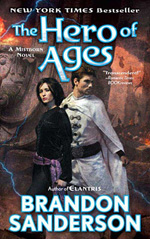
![]() verkisto
verkisto
7/26/2016
![]()
Sanderson brings the initial Mistborn series to a close with this book, and I found it to be a little underwhelming. I'd heard a lot about this series, and between that and enjoying the hell out of The Rithmatist, I went into the series expecting big things. Amazing things. Wowzer things. Instead, I got an overlong story that didn't seem to have a lot of content and didn't resonate with me, emotionally.
I've written in my other reviews about how the series appears to follow the usual high-fantasy tropes, but flips things around on you at the end of each novel. I still like that part of the trilogy, and I also like how seemingly incidental parts of the earlier books come back in the final book to have some importance on the plot. In some stories, it's easy to know when some small part at the start of the story will be significant, since those writers don't know how to bring those parts to light without making a big deal out of them. Sanderson brought them in as part of the story, but never highlighted their importance until it was necessary. It was nicely done, and impressive.
The thing is, I can appreciate a story without really liking it all that much, and that's how I feel about these three books. The Final Empire was a little ho-hum, but had a nice twist at the end that made me want to read more. The Well of Ascension felt like it had more story, and also ended on a point where I wanted to see what happened next. Now, The Hero of Ages pulls everything together, and while the ending is satisfactory (I never felt like Sanderson cheated us with the ending), it just doesn't have the kind of OOMPH I wanted it to have. It's hard to say why, really.
Part of it was how Sanderson explained why the world was in the state it was in. This is presented to us through epigrams at the start of each chapter, taken from a journal written after the events of the novel, to give further context, which gets a little ridiculous. It gives a reason for the ash, the Mistborn, the koloss, and everything else, but it destroys the mysticism that permeates the series. It's akin to George Lucas using midichlorians to describe the Force; in the end, it's better to leave the origins a mystery than to try to explain them away with pseudoscience.
I'm not a big fan of fantasy where the writers feel compelled to write archaically, with "thee"s and "thou"s all over the place, but neither am I a fan of fantasy where the author tries to use modern lingo in a fantasy setting. Alex Bledsoe does that to some degree in the Eddie LaCrosse series, and Sanderson does that to a small degree here. He uses the term "hat trick" to describe a victory in threes, and aside from the fact that the term hasn't existed in our current language very long, sports doesn't even feature in the series at all. It was something else that took me straight out of the story when I encountered it. It's sort of like an anachronism in reverse.
The Alloy of Law is next in this series, and that novel serves as a bridge between this trilogy and the next, which is set 300 years in the future, where technologies have developed to bring the world into what looks like the early 20th Century. That will take the general premise of Mistborn into an urban setting, and based on what little experience I have with Sanderson, that might be better; he seems to do better with urban fantasy than high fantasy.